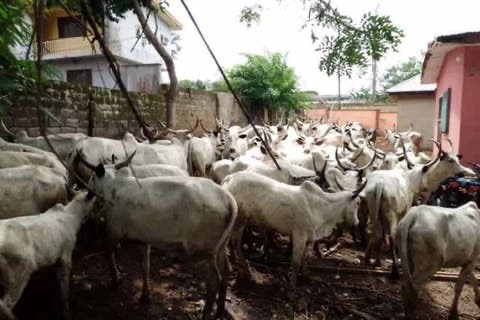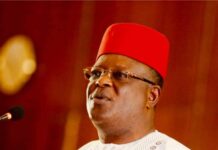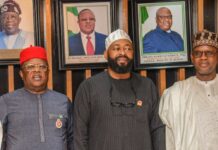Keeping Cattle In The North For Peace
By Ochereome Nnanna
Politics Digest – Call him whatever you like, but Dr. Abdullahi Ganduje, Governor of Kano State’s position on keeping Fulani herdsmen and their cattle away from trouble is unmatched. On this particular issue, Ganduje is a foremost Nigerian peace ambassador.
He not only preaches the need to stop livestock and their minders from roaming our wilderness and terrorising Nigerians, he is also establishing a ranching template which is worthy of emulation by other Northern governors. This will help eliminate the growing tensions between the Fulani and other Nigerian groups.
President Muhammadu Buhari’s government is pushing to grab lands and water resources belonging to indigenous peoples in all states of the federation for the establishment of cattle colonies, RUGA or grazing areas for Fulani herdsmen. They couched these unholy policies in their highly unpopular National Livestock Transformation Agenda, NLTA, launched in June 2018.
This was their reaction to the clamour for the ranching of livestock and ending of open grazing. Apart from modernising the livestock farming sector, this government believes that this will foster “peace”(of the graveyard).
Since government mooted the various components of this programme which are nothing but pan-Fulani nationwide resettlement and indigenisaton strategies, only the cattle breeders association, Miyetti Allah, has welcomed it. It will hand them on a platter of gold what they have been fighting to achieve with arms – indigenous people’s lands.
The unpopularity of these government policies has given rise to indigenous armed initiatives to ward off Fulani encroachments in the South West (Amotekun and the rise of Sunday Igboho, a potential ethnic warlord) and the Eastern Security Network, ESN, in the South East and South-South by the Indigenous Peoples of Biafra, IPOB, due to the inability of their lily-livered governors to do their jobs as the Chief Security Officers.
Clearly, government’s plan to forcibly settle Fulani herders all over the country in spite of open rejections by indigenous peoples is a recipe for endless wars between minority Fulani ethnic group and the vast majority of indigenous Nigerians! If unfortunately, things deteriorate, even government and its already weakened military forces may be unable to protect the same people it is forcing on indigenous groups.
Responsible governance ensures that any policy that will create or exacerbate ethnic tensions should be avoided at all cost. No intelligent or responsible government plays with fire.
Since ethnic tensions billowed as a result of perceived government plans to force members of the Fulani ethnic group from all over Africa on indigenous Nigerians, Governor Ganduje has taken the principled stand that Fulani nomads should be resettled in the North (such as Kano) where the Nigerians among them are indigenes.
Read Also:
In February 2018, Governor Ganduje called on the Fulani roaming the forests in places they were no longer wanted to relocate to Kano State. He promised to resettle them in ruga colonies. In June 2020, Ganduje, who is against the Buhari government policy of throwing our borders open to Fulani “from all over Africa”, pointed out that such invitation encourages the foreigners to bring in weapons and destabilise Nigeria.
The governor also called for the review of the so-called ECOWAS Protocols to end herdsmen migrations into Nigeria. He recently invited more herdsmen to Kano as he inspected the new ruga settlements in the Dansoshiya forest in Kiru Local Government Area. Why didn’t Buhari encourage his own Katsina to emulate Ganduje?
If every state in the North East and North West where Fulani are indigenes and which have vast grasslands suitable for cattle breeding follows Ganduje’s excellent example, there will be no need for them to stray to the Southern and Middle Belt forests. There will be no need for them to forcibly settle on people’s lands, terrorise the indigenes with assault weapons and commit crimes against humanity.
But, of course, following Ganduje’s example means obstructing the land-grab ambitions and ethnic expansionism being nursed by a section of the Fulani elite.
The Ganduje approach – resettling nomadic Fulani in the North – is the only peaceful way out of this issue. There have always been cattle markets all over the South. Fulani cattle owners can bring their livestock to the markets in the South only for sale. They should make arrangements to feed and water their livestock within such government-regulated markets.
The South also have their own breed of livestock (cows, goats, and goats), but even these are bred inside domestic enclosures, not in the forests or by open grazing. The South should also encourage their people to diversify into the cattle ranching business, specialising in the Southern or improved livestock breeds. This was the practice before the civil war when the Southern short-legged cows and goats which are valued over their Sahelian counterparts were bred in farm settlements.
The North with its vast grasslands is purpose-made by nature to thrive in livestock agriculture. It is their comparative advantage over the South. The South has more forests and farmlands than grasslands. Open grazing of livestock in Southern forests and farmlands is a trigger for armed conflicts.
This is particularly more so in the South East. Northern governors or politicians always boast that their states are larger than the entire South East. This means that South East does not have land for open cattle grazing. It is evil and provocative to seek cattle colonies or ruga settlements in such a small enclave with such an overflowing population.
The resistance to cattle settlements in the South and parts of the Middle Belt will never end. Rather, it is gathering traction. The promoters of the forceful Fulani resettlement agenda must stop it now. It will only consume lives and property and still fail.
Source: Vanguard

















